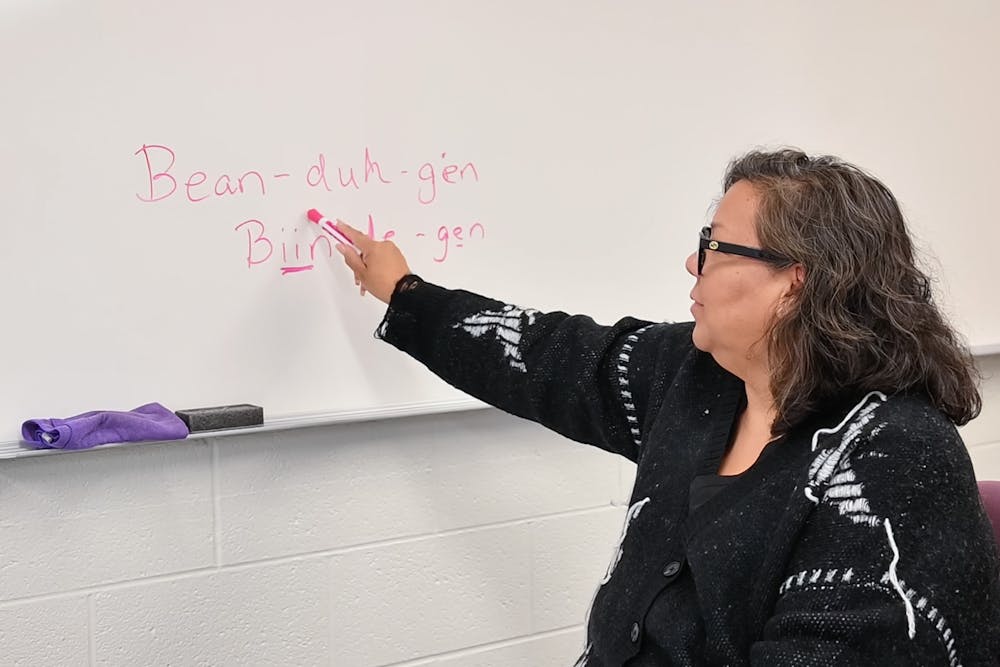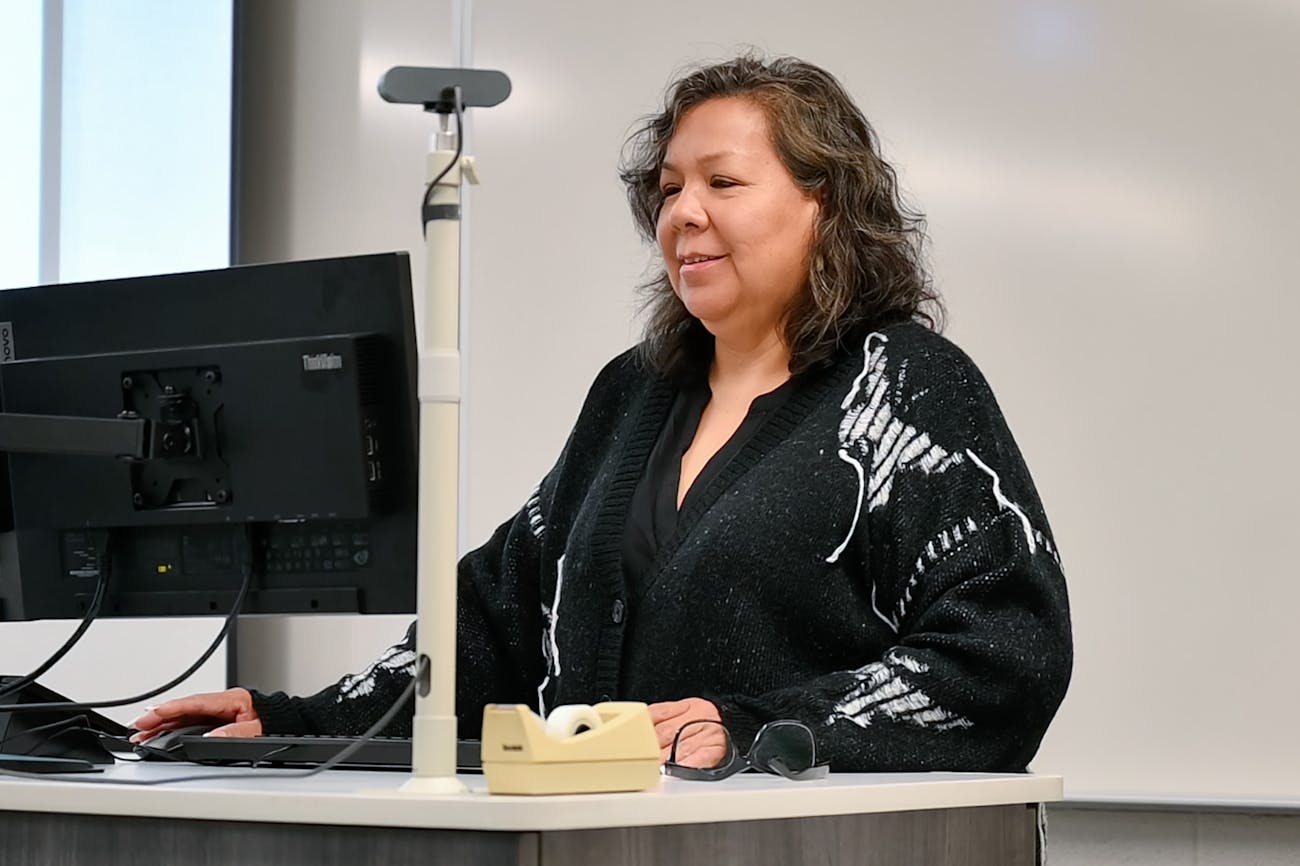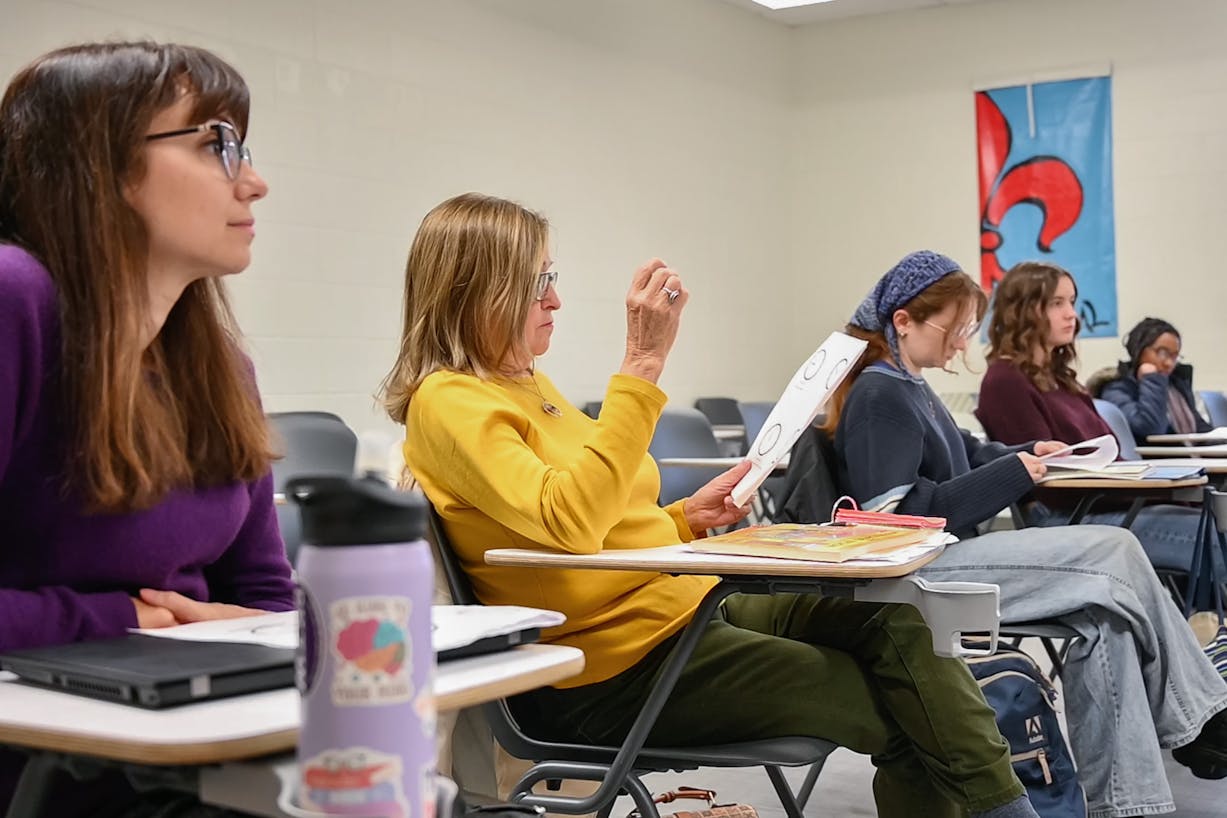Wii Gikendaming Anishinaabemowin
“We will know the Anishinaabe language”

Professor Judy Webkamigad teaches her Ojibwe 101 students how to say "hello" formally in Ojibwe in Pearce Hall on Thursday, Oct. 23, 2025. (CM-Life | Claire Vachon)
Making their return after the COVID-19 pandemic, Ojibwe language classes, Ojibwe 101 and 102, cover more than just the basics. Professor Judy Webkamigad prioritizes teaching students the culture behind the words.
“If we don’t have our language, we don’t have our culture. And if we don’t have our culture, we don’t have our language,” Webkamigad said.
The classes study the Anishinaabe and Anishinaabemowin, the community and language of the Ojibwe, Potawatomi and Odawa tribes. Webkamigad said she focuses on the Ojibwe language out of respect for the Saginaw Chippewa Indian tribe.
Webkamigad was approached last year while teaching at Bay Mills Community College.
“CMU really wants it,” she said. “CMU is dedicated to having it. I’m grateful the president is as well.”
Initially, when approached, Webkamigad was asked to simply teach the basics. But she explained that the basics aren’t just counting, objects or the vowel system. She said culture is necessary to contextualize Anishinaabemowin on campus, and she considers herself lucky to teach them together.
“I’m not just gonna teach words. (the language) comes with our culture as well,” she said.

Judy Webkamigad prepares her materials at the start of Ojibwe 101 on Oct. 23. Photo by Claire Vachon.
Webkamigad is an Indigenous educator with 20 years of experience. She’s Bodewadmi from the Hannahville Potawatomi Tribe in the Upper Peninsula and graduated from CMU, Bay Mills Community College and the Saginaw Chippewa Tribal College after studying Native American, cultural and global studies.
Initially when learning the language, Webkamigad had trouble understanding it. Her first professor told her she would know she understood the language when she started hearing it on the radio. After Webkamigad had a dream of that happening to her, something clicked.
“I knew from there that this is what I was destined to do, be a language keeper and not just keep it for me,” she said. “When I came here last summer, I thought, ‘This is where I belong.’ So here I am.”
She now passes the language on to her children and six students.
“I’ve been waiting for this class to come back, so I’m really excited to be learning the language with other people,” student Mia Petoskey said. “I like that it’s not just about learning the language, but also the culture, because it’s a reconnection to the Odawa side of my family. I just love being here.”
In order to teach non-Anishinaabe students, Webkamigad avoids using the immersion technique she was taught. She teaches her students the language phonetically when writing, spelling out how the words sound when pronounced instead of how they are actually spelled. It helps the students be able to speak the language easily, she said.
“It’s a really good entry-level class,” Petoskey said. “So, going into the next level, I feel very comfortable with it. I’m not overwhelmed.”
Student Britney Hill said she took the class because she enjoys learning more about Indigenous backgrounds. Another student, Amanda Scherr, enjoys connecting with the Tribe here.
“It’s been really great to learn the language,” Scherr said. “My mom and I are both part of the Sault Ste Marie Tribe of Chippewa Indians, but we’re not familiar with the language other than, like, a few words, so it’s great to learn how to actually speak it and see it used. And to learn more about the kind of cultural background and teachings as well.”

CMU students Britney Hill, Mia Petoskey, Amanda Scherr and Denise McDonald listen to a lecture in Ojibwe 101 in Pearce Hall on Thursday, Oct. 23, 2025. Elizabeth Sadecki, who is pictured second from the right, is Central Michigan Life's reporter. (CM-Life | Claire Vachon)
With learning in class comes a lot of laughter, Webkamigad said.
“I make it fun,” she said. “I don’t want it to be so serious. ... They just have a good sense of humor. We joke a lot, and when we shouldn’t either as well, but it’s humor. Humor, laughter is medicine, and this is the medicine that I’m teaching as our language.”
Webkamigad knows she’s doing the right thing by passing the language on to the next generation, and feels the support of her ancestors behind her. She will teach Ojibwe 102 this spring. The College of Liberal Arts and Social Sciences plans to offer these courses beyond this year.
“I think CMU is on the right path of keeping whatever information we have here, stays here,” Webkamigad said. “It’s theirs now, not just mine. I’m here to share with them, and they can keep it for the next person to teach.”



